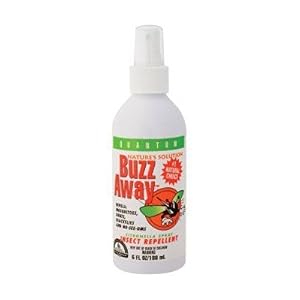I know that DEET is the party-line for a recommended ingredient in insect repellent, especially in the fear of mosquito-borne West Nile virus, but it is so toxic that I shudder to consider putting it on my skin. What you may not know, is that there are alternatives to using this toxic chemical that may be as effective as DEET at repelling biting insects and keeping you safe from West Nile Virus.
I remember coating myself at dusk with DEET-based OFF as a camper in the Rockies in the 70s and 80s, and then reaching for my flashlight and watching my DEET-coated fingers leave clear fingerprints in the hard plastic of my flashlight. The DEET melted the hard plastic flashlight casing! Traveling through Brazil in the early 90s, I often applied Aun, a potent DEET-based repellent, before bedding down in a hammock or cot in the heat of the jungle, hoping it would repel all manner of creepie-crawlies.
Prolonged and frequent use of DEET has been linked to neurologic issues that may not manifest until years after the exposure. Could these exposures have led to my diagnosis of multiple sclerosis in 1999? Maybe they helped push me over my personal toxic threshold.
I’d like to think I now know better than to put DEET on my body, but recently I was in a situation where a DEET-based insect repellent was the only option. And, I’ll admit, I used it because it seemed better than the alternative of being eaten alive, the feast of which had already begun, much to my alarm. I did try to apply it mainly to my clothing, rather than directly on my skin, but it was still on my hands.
For some reason, bugs love me. It must be my sweet blood. And they love my son, too, poor kid. And we both react to bites with large, itchy welts. My husband and my daughter seem to be less desirable, or maybe just less reactive, lucky them.
My husband took my son fishing in the mountains earlier this week, armed only with several natural, DEET-free herbal insect repellants. If I’ve learned anything in our thirteen years of marriage, it’s that fly fishermen like to hang out in the same places where the biting bugs like to hang out… I mean, swarm. That’s the main reason I’m not a fly fisher. Really, I gave it a good try, I did, and I paid for it dearly with several days of itching misery afterward. The fish had a better time than I, and I think my husband caught and released somewhere around thirty fish that day. (He’s somewhat of an uber-fly fisherman.)
My sweet-blooded son, on the other hand, remarkably emerged with fewer than ten mosquito bites after three days in the wilderness.
Accor ding to my husband, as long as he reapplied the natural bug spray every 30-40 minutes, when it would begin to wear off, it was as effective as DEET.
ding to my husband, as long as he reapplied the natural bug spray every 30-40 minutes, when it would begin to wear off, it was as effective as DEET.
My husband had at his disposal several natural bug repellent mixtures, including Dr. Ben Kim’s Anti-Bug Spray and Quantum Buzz Away. If pressed to pick a favorite, he names one we originally picked up at a farmer’s market and have since re-ordered online, the Herbal Insect Repellent from Green Earth Farm. He likes the small size that fits in his fishing vest pocket, because, as he stresses, you have to reapply it frequently for it to be effective. And he thinks it smells the best, while still being as effective as the others.
I have ordered some of those new repellent bracelets that last for more than a week, and will let you know when I can evaluate their safety and efficacy.
Here are another eleven creative homemade mosquito repellents to keep the bugs out of your air space, with varying results. Let us know if you have other good natural insect repellents to suggest!

